University Nursing: Annotated Bibliography for NRS10731
VerifiedAdded on 2022/12/28
|9
|1573
|55
Annotated Bibliography
AI Summary
This annotated bibliography examines the implications of social media on nursing practice, focusing on patient privacy, professional conduct, and ethical considerations. The bibliography includes two articles. The first article discusses issues of privacy and confidentiality that nurses must ensure when using online platforms. It highlights factors that contribute to privacy breaches and emphasizes the importance of adhering to professional standards set by organizations like AHPRA and NMBA. The second article explores nursing students' perceptions of confidentiality, e-professionalism, and privacy in relation to Facebook. The study reveals students' awareness of ethical breaches and the need for educational policies on social media usage. Both articles emphasize the relevance of these issues to the nursing profession, particularly in maintaining patient confidentiality and adhering to professional standards. The articles also provide insights into the importance of educational curricula in addressing these issues.
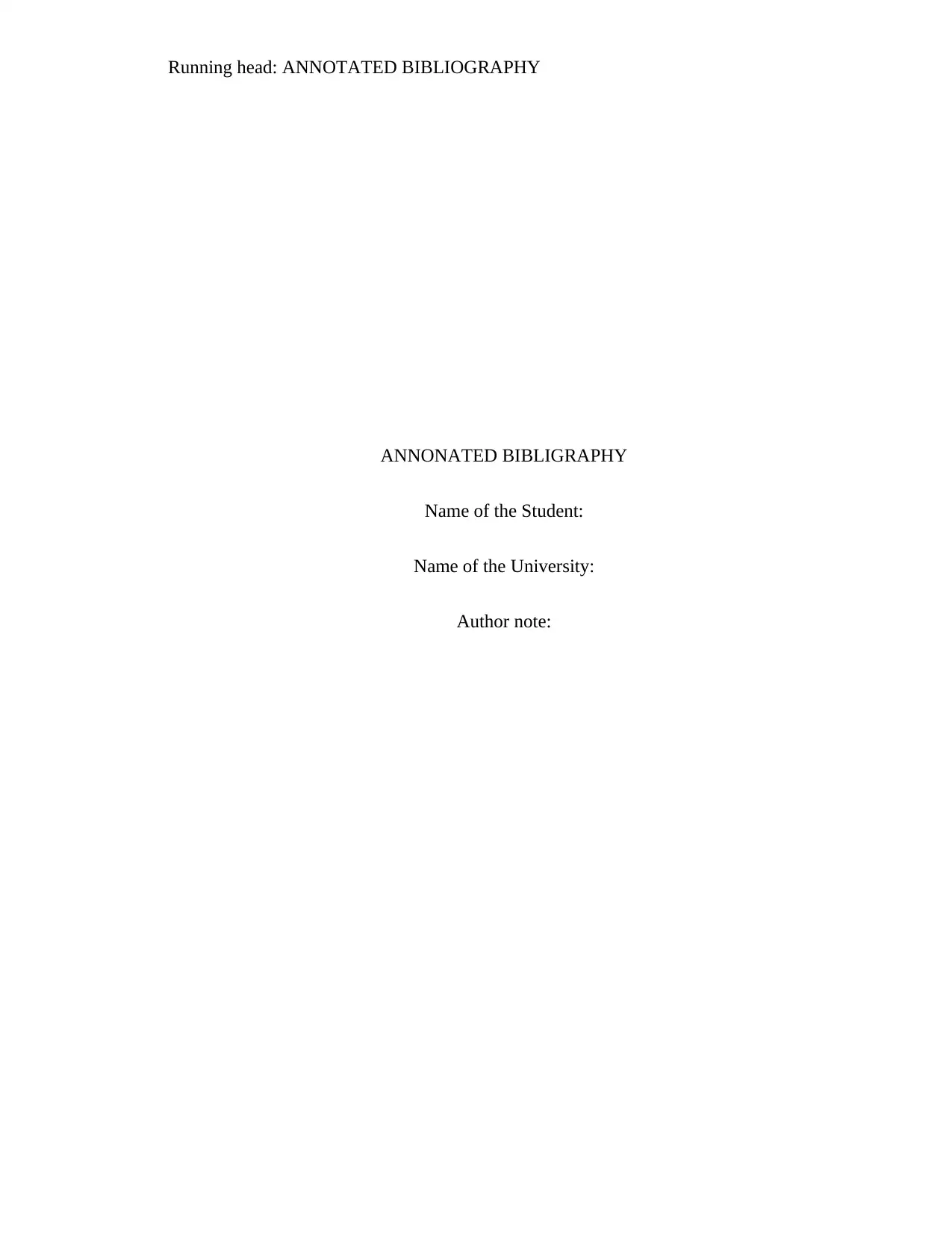
Running head: ANNOTATED BIBLIOGRAPHY
ANNONATED BIBLIGRAPHY
Name of the Student:
Name of the University:
Author note:
ANNONATED BIBLIGRAPHY
Name of the Student:
Name of the University:
Author note:
Paraphrase This Document
Need a fresh take? Get an instant paraphrase of this document with our AI Paraphraser
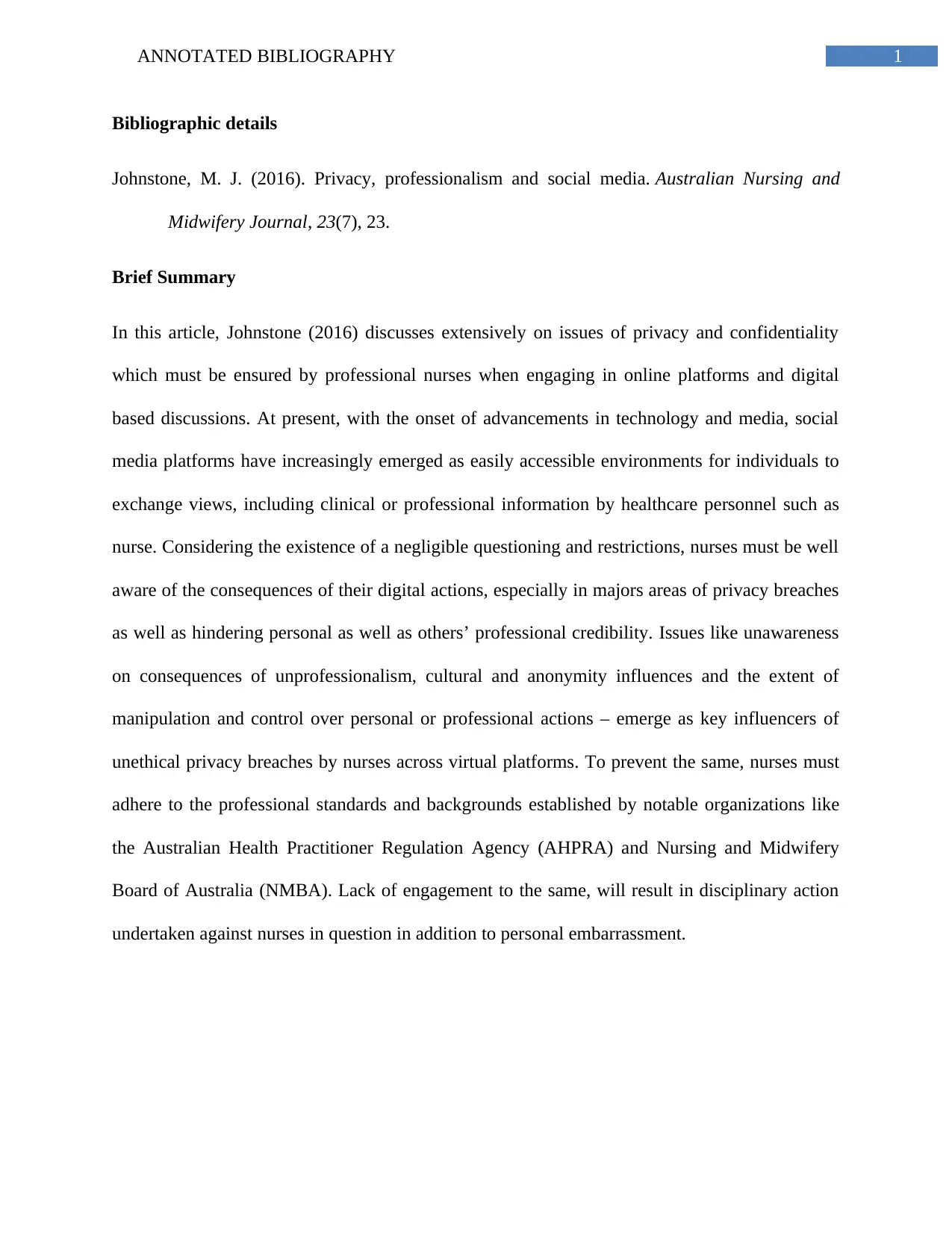
1ANNOTATED BIBLIOGRAPHY
Bibliographic details
Johnstone, M. J. (2016). Privacy, professionalism and social media. Australian Nursing and
Midwifery Journal, 23(7), 23.
Brief Summary
In this article, Johnstone (2016) discusses extensively on issues of privacy and confidentiality
which must be ensured by professional nurses when engaging in online platforms and digital
based discussions. At present, with the onset of advancements in technology and media, social
media platforms have increasingly emerged as easily accessible environments for individuals to
exchange views, including clinical or professional information by healthcare personnel such as
nurse. Considering the existence of a negligible questioning and restrictions, nurses must be well
aware of the consequences of their digital actions, especially in majors areas of privacy breaches
as well as hindering personal as well as others’ professional credibility. Issues like unawareness
on consequences of unprofessionalism, cultural and anonymity influences and the extent of
manipulation and control over personal or professional actions – emerge as key influencers of
unethical privacy breaches by nurses across virtual platforms. To prevent the same, nurses must
adhere to the professional standards and backgrounds established by notable organizations like
the Australian Health Practitioner Regulation Agency (AHPRA) and Nursing and Midwifery
Board of Australia (NMBA). Lack of engagement to the same, will result in disciplinary action
undertaken against nurses in question in addition to personal embarrassment.
Bibliographic details
Johnstone, M. J. (2016). Privacy, professionalism and social media. Australian Nursing and
Midwifery Journal, 23(7), 23.
Brief Summary
In this article, Johnstone (2016) discusses extensively on issues of privacy and confidentiality
which must be ensured by professional nurses when engaging in online platforms and digital
based discussions. At present, with the onset of advancements in technology and media, social
media platforms have increasingly emerged as easily accessible environments for individuals to
exchange views, including clinical or professional information by healthcare personnel such as
nurse. Considering the existence of a negligible questioning and restrictions, nurses must be well
aware of the consequences of their digital actions, especially in majors areas of privacy breaches
as well as hindering personal as well as others’ professional credibility. Issues like unawareness
on consequences of unprofessionalism, cultural and anonymity influences and the extent of
manipulation and control over personal or professional actions – emerge as key influencers of
unethical privacy breaches by nurses across virtual platforms. To prevent the same, nurses must
adhere to the professional standards and backgrounds established by notable organizations like
the Australian Health Practitioner Regulation Agency (AHPRA) and Nursing and Midwifery
Board of Australia (NMBA). Lack of engagement to the same, will result in disciplinary action
undertaken against nurses in question in addition to personal embarrassment.
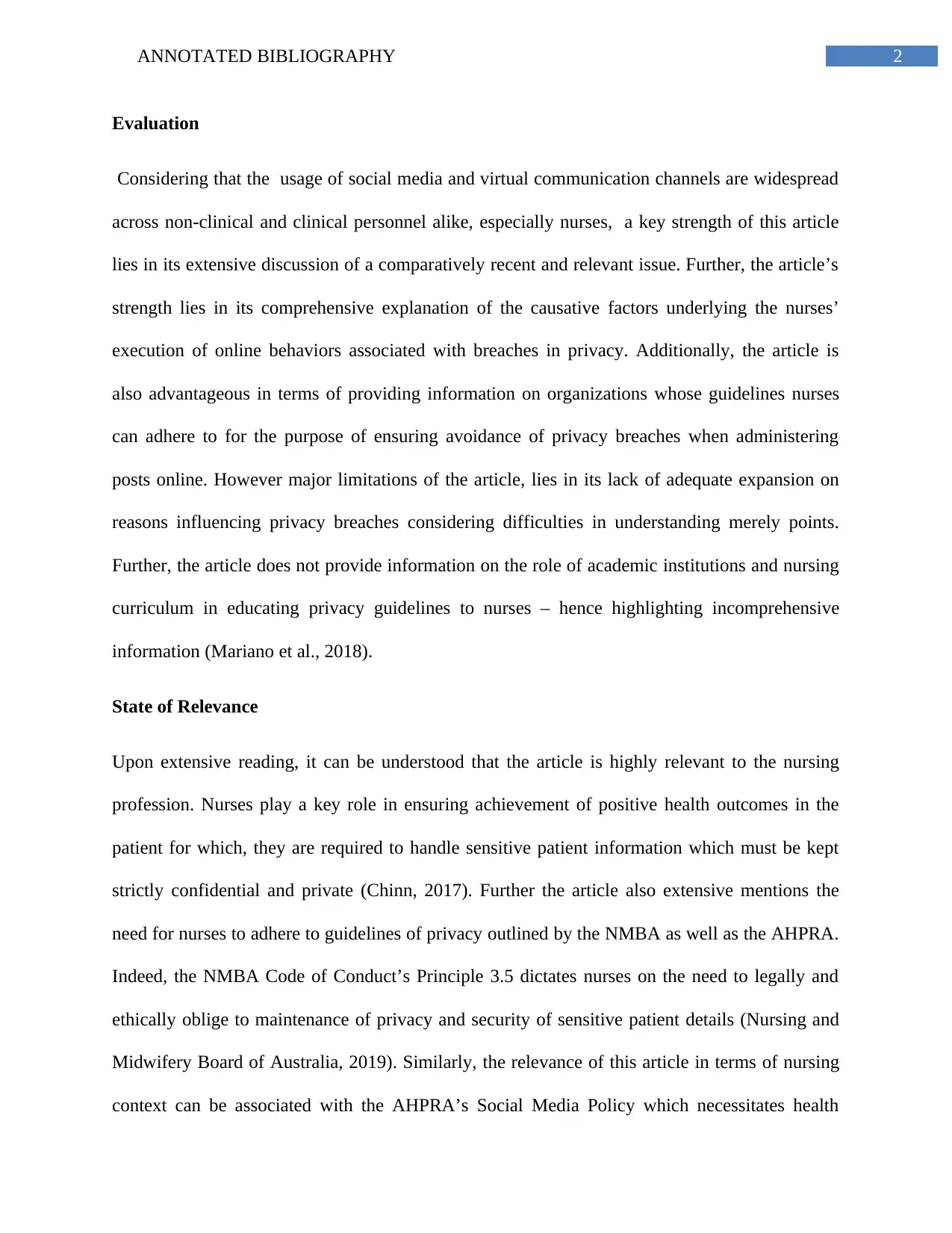
2ANNOTATED BIBLIOGRAPHY
Evaluation
Considering that the usage of social media and virtual communication channels are widespread
across non-clinical and clinical personnel alike, especially nurses, a key strength of this article
lies in its extensive discussion of a comparatively recent and relevant issue. Further, the article’s
strength lies in its comprehensive explanation of the causative factors underlying the nurses’
execution of online behaviors associated with breaches in privacy. Additionally, the article is
also advantageous in terms of providing information on organizations whose guidelines nurses
can adhere to for the purpose of ensuring avoidance of privacy breaches when administering
posts online. However major limitations of the article, lies in its lack of adequate expansion on
reasons influencing privacy breaches considering difficulties in understanding merely points.
Further, the article does not provide information on the role of academic institutions and nursing
curriculum in educating privacy guidelines to nurses – hence highlighting incomprehensive
information (Mariano et al., 2018).
State of Relevance
Upon extensive reading, it can be understood that the article is highly relevant to the nursing
profession. Nurses play a key role in ensuring achievement of positive health outcomes in the
patient for which, they are required to handle sensitive patient information which must be kept
strictly confidential and private (Chinn, 2017). Further the article also extensive mentions the
need for nurses to adhere to guidelines of privacy outlined by the NMBA as well as the AHPRA.
Indeed, the NMBA Code of Conduct’s Principle 3.5 dictates nurses on the need to legally and
ethically oblige to maintenance of privacy and security of sensitive patient details (Nursing and
Midwifery Board of Australia, 2019). Similarly, the relevance of this article in terms of nursing
context can be associated with the AHPRA’s Social Media Policy which necessitates health
Evaluation
Considering that the usage of social media and virtual communication channels are widespread
across non-clinical and clinical personnel alike, especially nurses, a key strength of this article
lies in its extensive discussion of a comparatively recent and relevant issue. Further, the article’s
strength lies in its comprehensive explanation of the causative factors underlying the nurses’
execution of online behaviors associated with breaches in privacy. Additionally, the article is
also advantageous in terms of providing information on organizations whose guidelines nurses
can adhere to for the purpose of ensuring avoidance of privacy breaches when administering
posts online. However major limitations of the article, lies in its lack of adequate expansion on
reasons influencing privacy breaches considering difficulties in understanding merely points.
Further, the article does not provide information on the role of academic institutions and nursing
curriculum in educating privacy guidelines to nurses – hence highlighting incomprehensive
information (Mariano et al., 2018).
State of Relevance
Upon extensive reading, it can be understood that the article is highly relevant to the nursing
profession. Nurses play a key role in ensuring achievement of positive health outcomes in the
patient for which, they are required to handle sensitive patient information which must be kept
strictly confidential and private (Chinn, 2017). Further the article also extensive mentions the
need for nurses to adhere to guidelines of privacy outlined by the NMBA as well as the AHPRA.
Indeed, the NMBA Code of Conduct’s Principle 3.5 dictates nurses on the need to legally and
ethically oblige to maintenance of privacy and security of sensitive patient details (Nursing and
Midwifery Board of Australia, 2019). Similarly, the relevance of this article in terms of nursing
context can be associated with the AHPRA’s Social Media Policy which necessitates health
⊘ This is a preview!⊘
Do you want full access?
Subscribe today to unlock all pages.

Trusted by 1+ million students worldwide
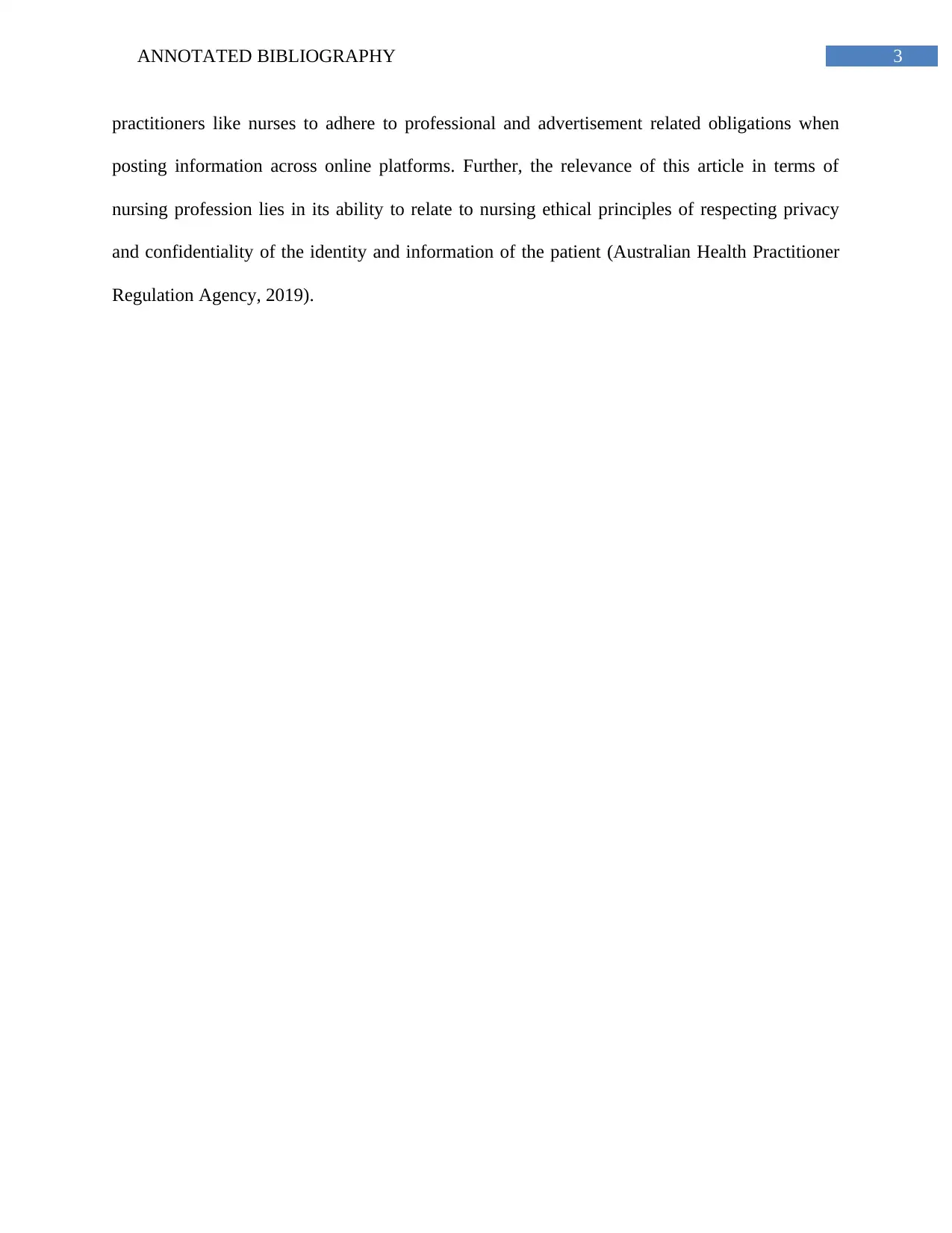
3ANNOTATED BIBLIOGRAPHY
practitioners like nurses to adhere to professional and advertisement related obligations when
posting information across online platforms. Further, the relevance of this article in terms of
nursing profession lies in its ability to relate to nursing ethical principles of respecting privacy
and confidentiality of the identity and information of the patient (Australian Health Practitioner
Regulation Agency, 2019).
practitioners like nurses to adhere to professional and advertisement related obligations when
posting information across online platforms. Further, the relevance of this article in terms of
nursing profession lies in its ability to relate to nursing ethical principles of respecting privacy
and confidentiality of the identity and information of the patient (Australian Health Practitioner
Regulation Agency, 2019).
Paraphrase This Document
Need a fresh take? Get an instant paraphrase of this document with our AI Paraphraser
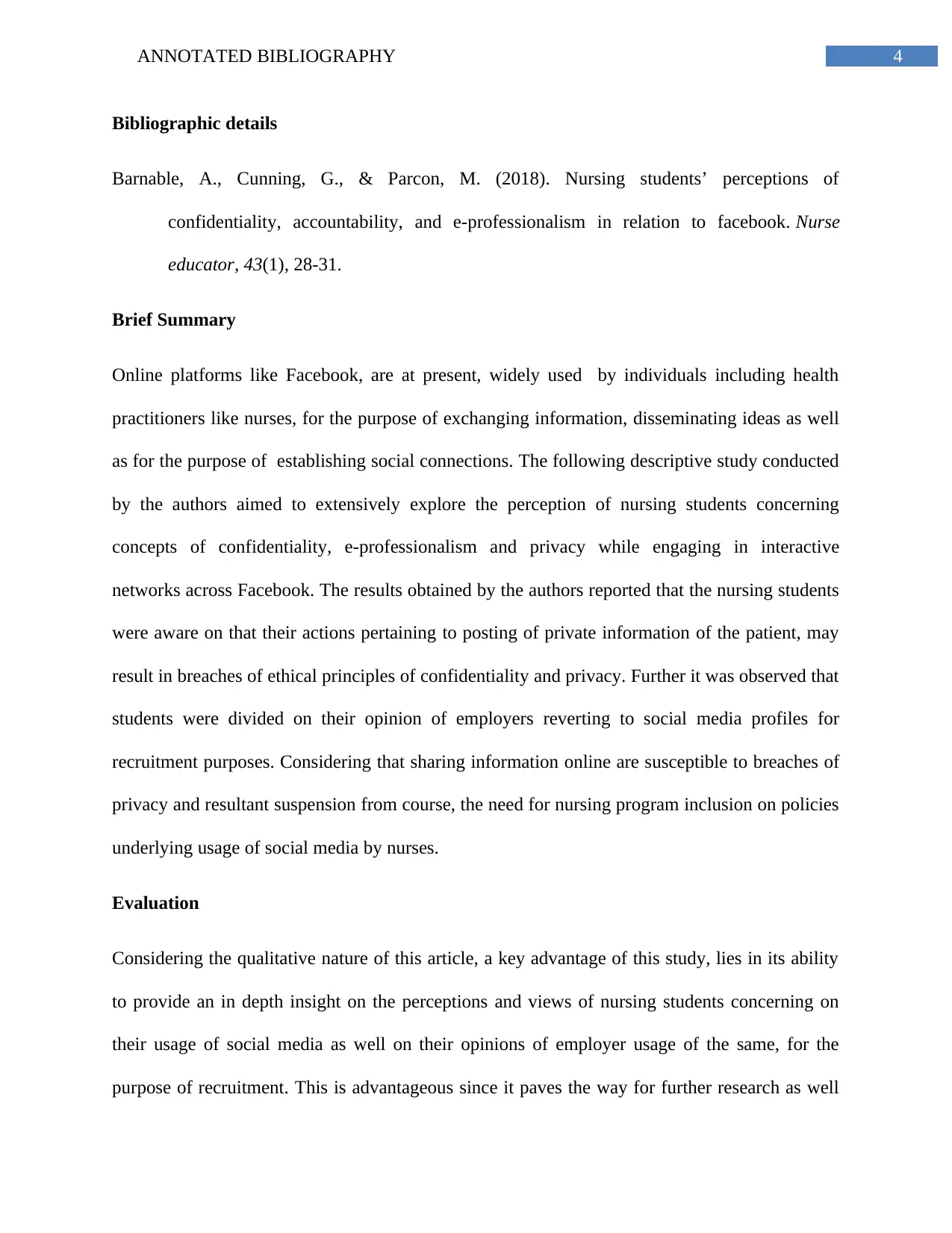
4ANNOTATED BIBLIOGRAPHY
Bibliographic details
Barnable, A., Cunning, G., & Parcon, M. (2018). Nursing students’ perceptions of
confidentiality, accountability, and e-professionalism in relation to facebook. Nurse
educator, 43(1), 28-31.
Brief Summary
Online platforms like Facebook, are at present, widely used by individuals including health
practitioners like nurses, for the purpose of exchanging information, disseminating ideas as well
as for the purpose of establishing social connections. The following descriptive study conducted
by the authors aimed to extensively explore the perception of nursing students concerning
concepts of confidentiality, e-professionalism and privacy while engaging in interactive
networks across Facebook. The results obtained by the authors reported that the nursing students
were aware on that their actions pertaining to posting of private information of the patient, may
result in breaches of ethical principles of confidentiality and privacy. Further it was observed that
students were divided on their opinion of employers reverting to social media profiles for
recruitment purposes. Considering that sharing information online are susceptible to breaches of
privacy and resultant suspension from course, the need for nursing program inclusion on policies
underlying usage of social media by nurses.
Evaluation
Considering the qualitative nature of this article, a key advantage of this study, lies in its ability
to provide an in depth insight on the perceptions and views of nursing students concerning on
their usage of social media as well on their opinions of employer usage of the same, for the
purpose of recruitment. This is advantageous since it paves the way for further research as well
Bibliographic details
Barnable, A., Cunning, G., & Parcon, M. (2018). Nursing students’ perceptions of
confidentiality, accountability, and e-professionalism in relation to facebook. Nurse
educator, 43(1), 28-31.
Brief Summary
Online platforms like Facebook, are at present, widely used by individuals including health
practitioners like nurses, for the purpose of exchanging information, disseminating ideas as well
as for the purpose of establishing social connections. The following descriptive study conducted
by the authors aimed to extensively explore the perception of nursing students concerning
concepts of confidentiality, e-professionalism and privacy while engaging in interactive
networks across Facebook. The results obtained by the authors reported that the nursing students
were aware on that their actions pertaining to posting of private information of the patient, may
result in breaches of ethical principles of confidentiality and privacy. Further it was observed that
students were divided on their opinion of employers reverting to social media profiles for
recruitment purposes. Considering that sharing information online are susceptible to breaches of
privacy and resultant suspension from course, the need for nursing program inclusion on policies
underlying usage of social media by nurses.
Evaluation
Considering the qualitative nature of this article, a key advantage of this study, lies in its ability
to provide an in depth insight on the perceptions and views of nursing students concerning on
their usage of social media as well on their opinions of employer usage of the same, for the
purpose of recruitment. This is advantageous since it paves the way for further research as well
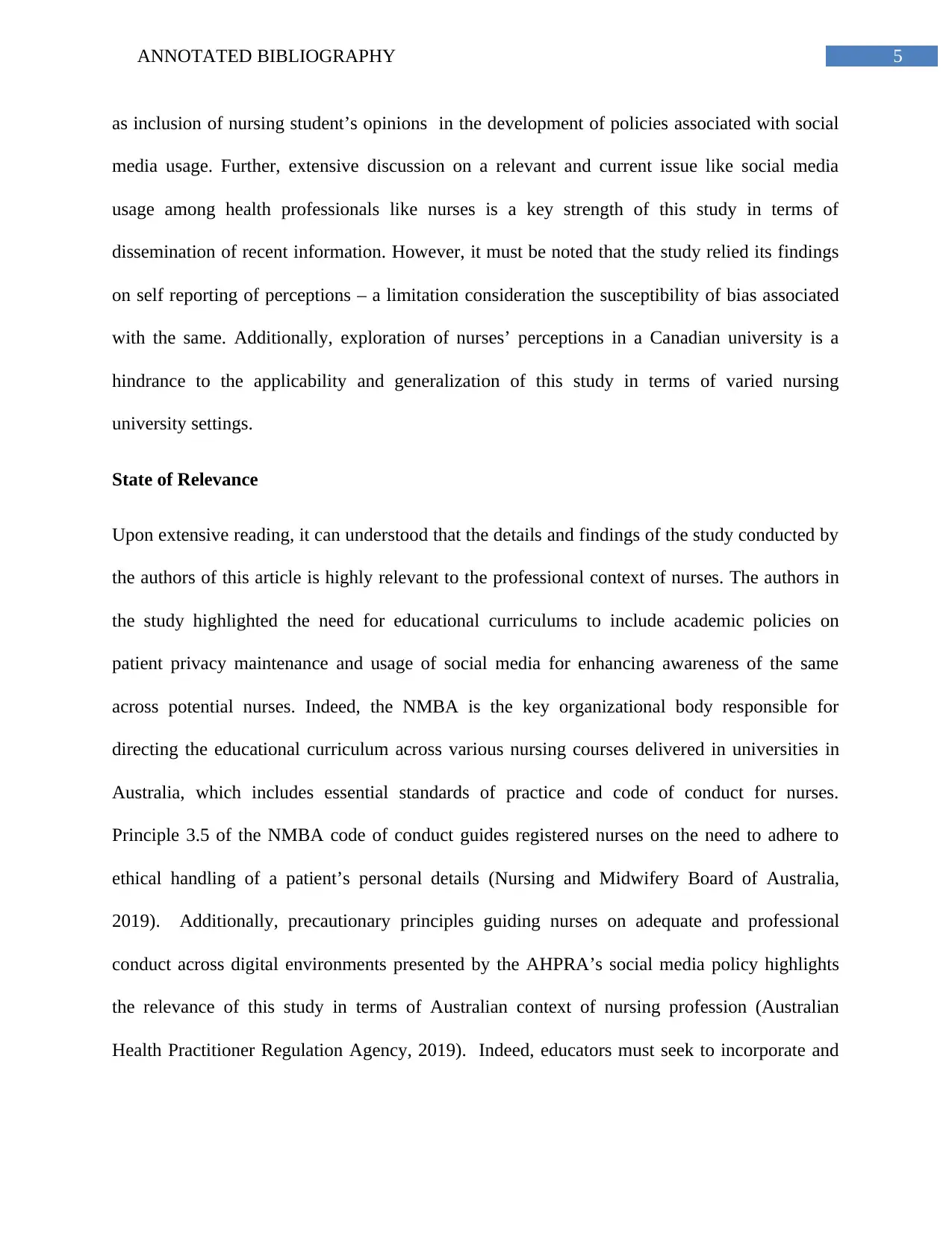
5ANNOTATED BIBLIOGRAPHY
as inclusion of nursing student’s opinions in the development of policies associated with social
media usage. Further, extensive discussion on a relevant and current issue like social media
usage among health professionals like nurses is a key strength of this study in terms of
dissemination of recent information. However, it must be noted that the study relied its findings
on self reporting of perceptions – a limitation consideration the susceptibility of bias associated
with the same. Additionally, exploration of nurses’ perceptions in a Canadian university is a
hindrance to the applicability and generalization of this study in terms of varied nursing
university settings.
State of Relevance
Upon extensive reading, it can understood that the details and findings of the study conducted by
the authors of this article is highly relevant to the professional context of nurses. The authors in
the study highlighted the need for educational curriculums to include academic policies on
patient privacy maintenance and usage of social media for enhancing awareness of the same
across potential nurses. Indeed, the NMBA is the key organizational body responsible for
directing the educational curriculum across various nursing courses delivered in universities in
Australia, which includes essential standards of practice and code of conduct for nurses.
Principle 3.5 of the NMBA code of conduct guides registered nurses on the need to adhere to
ethical handling of a patient’s personal details (Nursing and Midwifery Board of Australia,
2019). Additionally, precautionary principles guiding nurses on adequate and professional
conduct across digital environments presented by the AHPRA’s social media policy highlights
the relevance of this study in terms of Australian context of nursing profession (Australian
Health Practitioner Regulation Agency, 2019). Indeed, educators must seek to incorporate and
as inclusion of nursing student’s opinions in the development of policies associated with social
media usage. Further, extensive discussion on a relevant and current issue like social media
usage among health professionals like nurses is a key strength of this study in terms of
dissemination of recent information. However, it must be noted that the study relied its findings
on self reporting of perceptions – a limitation consideration the susceptibility of bias associated
with the same. Additionally, exploration of nurses’ perceptions in a Canadian university is a
hindrance to the applicability and generalization of this study in terms of varied nursing
university settings.
State of Relevance
Upon extensive reading, it can understood that the details and findings of the study conducted by
the authors of this article is highly relevant to the professional context of nurses. The authors in
the study highlighted the need for educational curriculums to include academic policies on
patient privacy maintenance and usage of social media for enhancing awareness of the same
across potential nurses. Indeed, the NMBA is the key organizational body responsible for
directing the educational curriculum across various nursing courses delivered in universities in
Australia, which includes essential standards of practice and code of conduct for nurses.
Principle 3.5 of the NMBA code of conduct guides registered nurses on the need to adhere to
ethical handling of a patient’s personal details (Nursing and Midwifery Board of Australia,
2019). Additionally, precautionary principles guiding nurses on adequate and professional
conduct across digital environments presented by the AHPRA’s social media policy highlights
the relevance of this study in terms of Australian context of nursing profession (Australian
Health Practitioner Regulation Agency, 2019). Indeed, educators must seek to incorporate and
⊘ This is a preview!⊘
Do you want full access?
Subscribe today to unlock all pages.

Trusted by 1+ million students worldwide
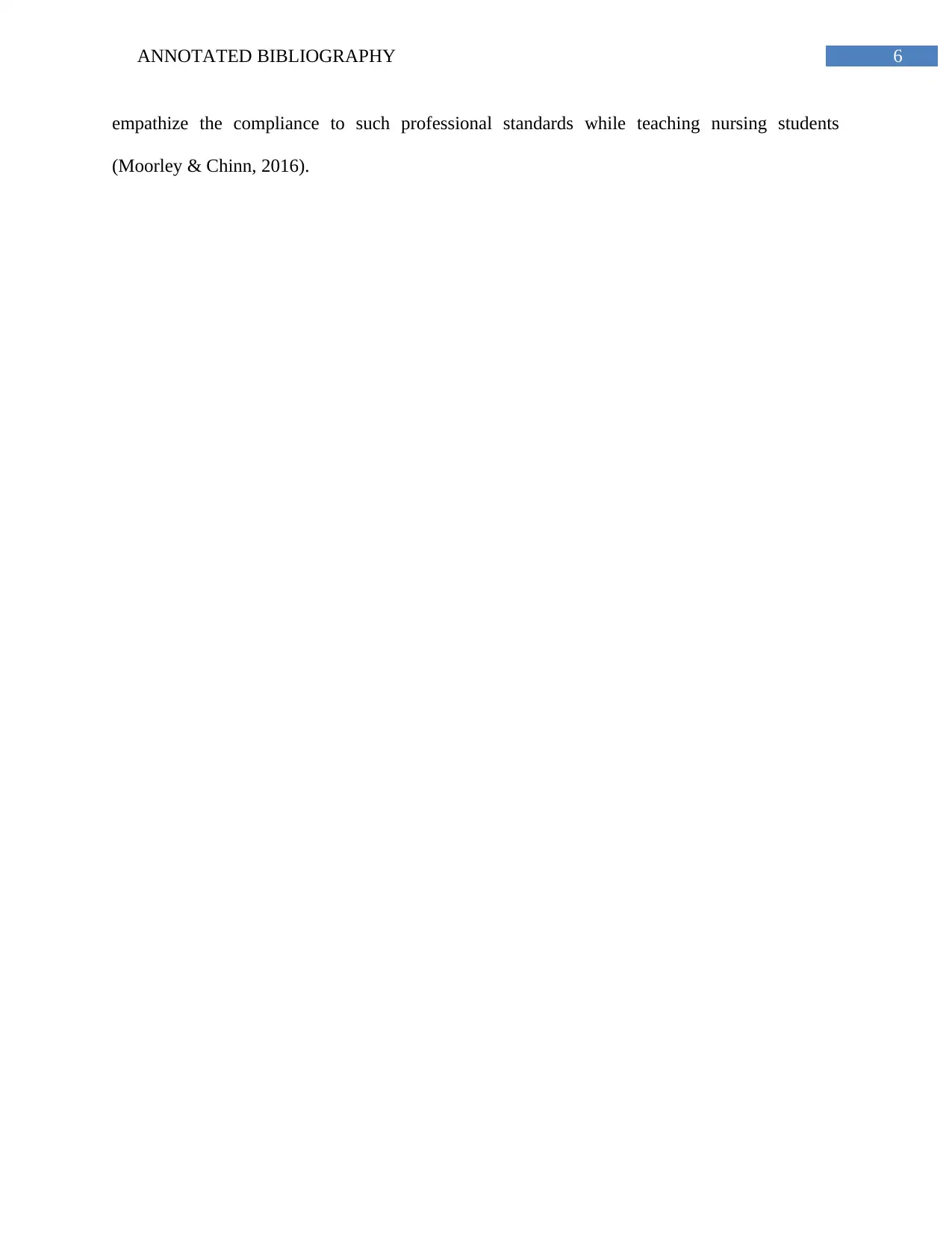
6ANNOTATED BIBLIOGRAPHY
empathize the compliance to such professional standards while teaching nursing students
(Moorley & Chinn, 2016).
empathize the compliance to such professional standards while teaching nursing students
(Moorley & Chinn, 2016).
Paraphrase This Document
Need a fresh take? Get an instant paraphrase of this document with our AI Paraphraser
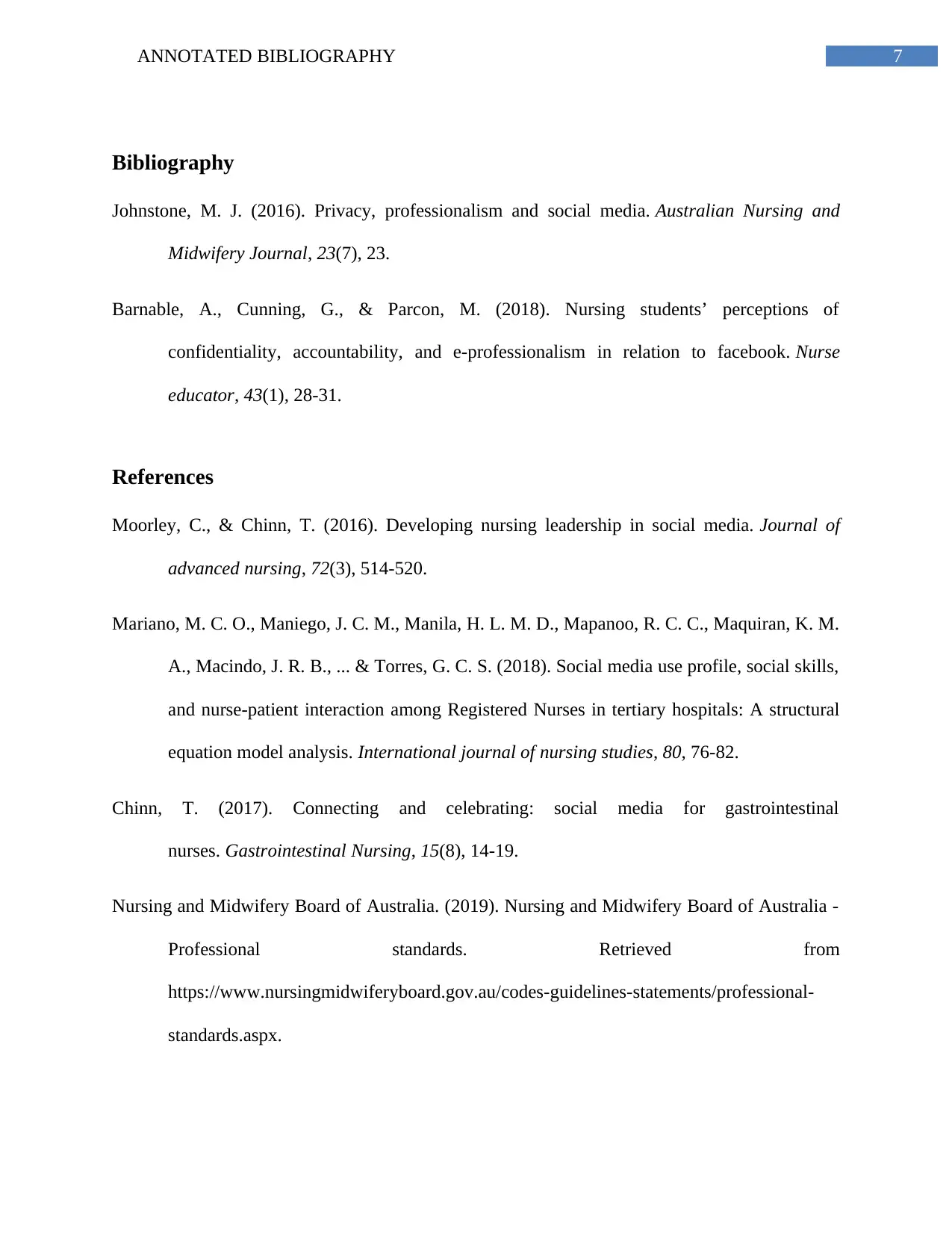
7ANNOTATED BIBLIOGRAPHY
Bibliography
Johnstone, M. J. (2016). Privacy, professionalism and social media. Australian Nursing and
Midwifery Journal, 23(7), 23.
Barnable, A., Cunning, G., & Parcon, M. (2018). Nursing students’ perceptions of
confidentiality, accountability, and e-professionalism in relation to facebook. Nurse
educator, 43(1), 28-31.
References
Moorley, C., & Chinn, T. (2016). Developing nursing leadership in social media. Journal of
advanced nursing, 72(3), 514-520.
Mariano, M. C. O., Maniego, J. C. M., Manila, H. L. M. D., Mapanoo, R. C. C., Maquiran, K. M.
A., Macindo, J. R. B., ... & Torres, G. C. S. (2018). Social media use profile, social skills,
and nurse-patient interaction among Registered Nurses in tertiary hospitals: A structural
equation model analysis. International journal of nursing studies, 80, 76-82.
Chinn, T. (2017). Connecting and celebrating: social media for gastrointestinal
nurses. Gastrointestinal Nursing, 15(8), 14-19.
Nursing and Midwifery Board of Australia. (2019). Nursing and Midwifery Board of Australia -
Professional standards. Retrieved from
https://www.nursingmidwiferyboard.gov.au/codes-guidelines-statements/professional-
standards.aspx.
Bibliography
Johnstone, M. J. (2016). Privacy, professionalism and social media. Australian Nursing and
Midwifery Journal, 23(7), 23.
Barnable, A., Cunning, G., & Parcon, M. (2018). Nursing students’ perceptions of
confidentiality, accountability, and e-professionalism in relation to facebook. Nurse
educator, 43(1), 28-31.
References
Moorley, C., & Chinn, T. (2016). Developing nursing leadership in social media. Journal of
advanced nursing, 72(3), 514-520.
Mariano, M. C. O., Maniego, J. C. M., Manila, H. L. M. D., Mapanoo, R. C. C., Maquiran, K. M.
A., Macindo, J. R. B., ... & Torres, G. C. S. (2018). Social media use profile, social skills,
and nurse-patient interaction among Registered Nurses in tertiary hospitals: A structural
equation model analysis. International journal of nursing studies, 80, 76-82.
Chinn, T. (2017). Connecting and celebrating: social media for gastrointestinal
nurses. Gastrointestinal Nursing, 15(8), 14-19.
Nursing and Midwifery Board of Australia. (2019). Nursing and Midwifery Board of Australia -
Professional standards. Retrieved from
https://www.nursingmidwiferyboard.gov.au/codes-guidelines-statements/professional-
standards.aspx.
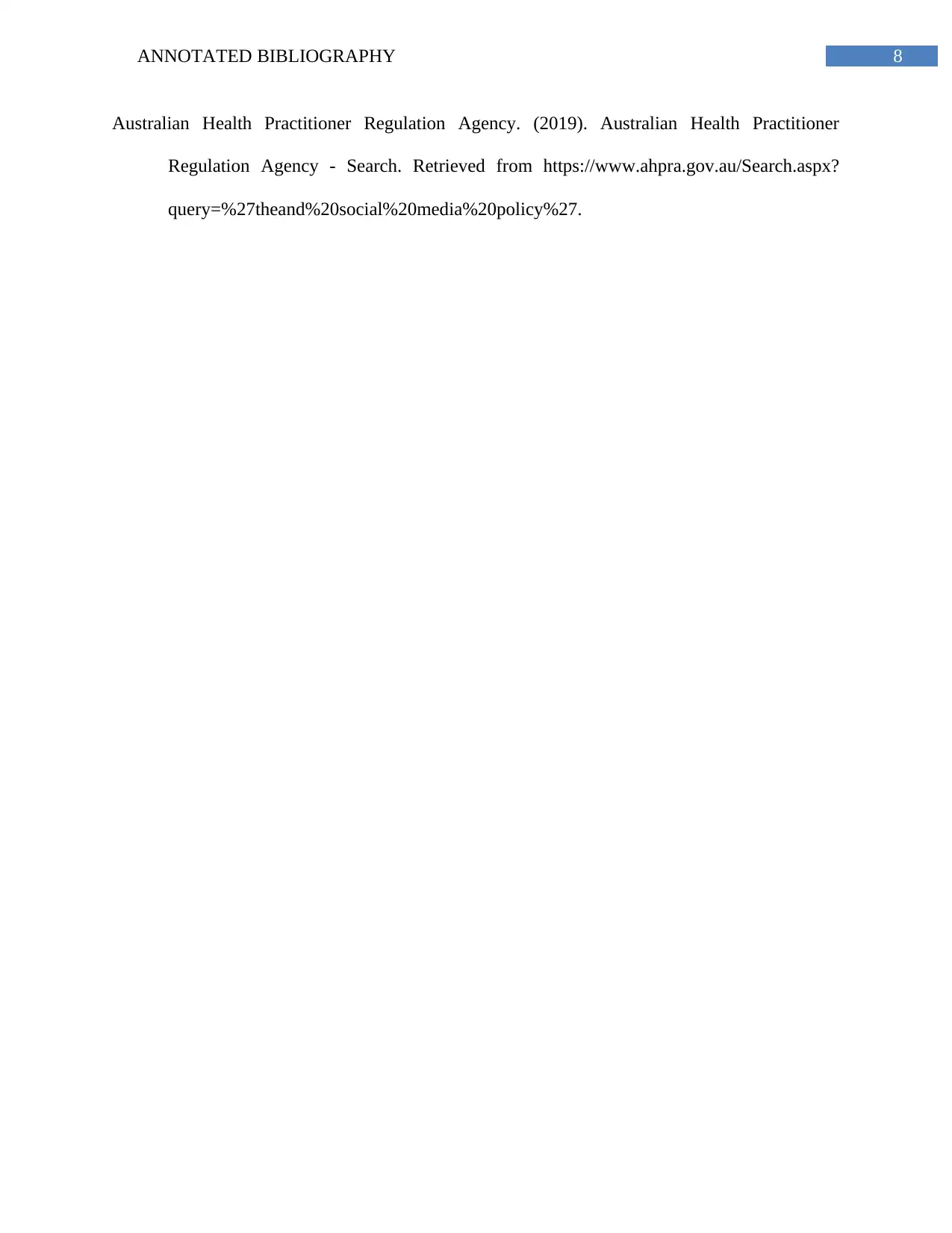
8ANNOTATED BIBLIOGRAPHY
Australian Health Practitioner Regulation Agency. (2019). Australian Health Practitioner
Regulation Agency - Search. Retrieved from https://www.ahpra.gov.au/Search.aspx?
query=%27theand%20social%20media%20policy%27.
Australian Health Practitioner Regulation Agency. (2019). Australian Health Practitioner
Regulation Agency - Search. Retrieved from https://www.ahpra.gov.au/Search.aspx?
query=%27theand%20social%20media%20policy%27.
⊘ This is a preview!⊘
Do you want full access?
Subscribe today to unlock all pages.

Trusted by 1+ million students worldwide
1 out of 9
Related Documents
Your All-in-One AI-Powered Toolkit for Academic Success.
+13062052269
info@desklib.com
Available 24*7 on WhatsApp / Email
![[object Object]](/_next/static/media/star-bottom.7253800d.svg)
Unlock your academic potential
Copyright © 2020–2026 A2Z Services. All Rights Reserved. Developed and managed by ZUCOL.





